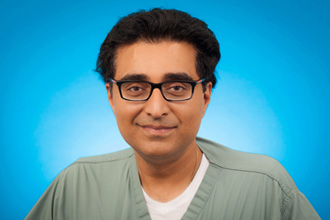Diabetes medication increases cardiac energy in diabetes patients through glucose and fatty acid oxidation, study finds

By Madison Thakore
- RELATED RESEARCH: New medications for diabetes management have additional heart benefits, study finds

Dr. Subodh Verma
A medication used to treat Type 2 diabetes was found to have a positive impact on cardiac energy amongst diabetes patients, according to a study completed by Dr. Subodh Verma, cardiac surgeon-scientist and director of the CardioLink platform at the Keenan Research Centre for Biomedical Science (KRCBS) of St. Michael’s Hospital, and his research team.
The study, published this weekend in JACC: Basic to Translational Science journal and simultaneously presented at the European Society of Cardiology Annual Congress, found an increase in cardiac energy production associated with the use of empagliflozin – a medication used to treat Type 2 diabetes. In diabetes patients, cardiac failure can develop due to low glucose oxidation and decreased production of cardiac adenosine triphosphate (ATP) – a compound present in all living tissue.
Dr. Verma and his team determined empagliflozin contributed to increased cardiac energy, however it does so through glucose and fatty acid oxidation rather than ketone oxidation as originally suggested.
“In experimental diabetes, the heart experiences substantial changes in ATP production and the energy becomes starved,” explained Dr. Verma. “What we have shown here is that there is more energy being provided to the heart through empagliflozin treatment. The diabetic heart benefits from empagliflozin through energetic improvements and that is a very critical translation to support ongoing heart failure research.”
Dr. Verma and his team produced this research to determine the impact of this particular treatment on the production of cardiac energy and its further impact on the prevention of heart failure.
“Understanding the basis through which these agents work provides us with the ability to develop a clinical trial to lead to solutions and treatments for heart failure,” says Dr. Verma. “These data strengthen the thesis of the positive impact this treatment may have on diabetes patients.”
This study was funded by Boehringer Ingelheim and Eli Lilly, two pharmaceutical companies who are in an alliance to manufacture empagliflozin, and the Canadian Institutes of Health Research.
These papers are an example of how St. Michael’s Hospital is making Ontario Healthier, Wealthier, Smarter.
About St. Michael’s Hospital
St. Michael’s Hospital provides compassionate care to all who enter its doors. The hospital also provides outstanding medical education to future health care professionals in more than 29 academic disciplines. Critical care and trauma, heart disease, neurosurgery, diabetes, cancer care, care of the homeless and global health are among the Hospital’s recognized areas of expertise. Through the Keenan Research Centre and the Li Ka Shing International Healthcare Education Centre, which make up the Li Ka Shing Knowledge Institute, research and education at St. Michael’s Hospital are recognized and make an impact around the world. Founded in 1892, the hospital is fully affiliated with the University of Toronto.
St. Michael’s Hospital with Providence Healthcare and St. Joseph’s Health Centre now operate under one corporate entity as of August 1, 2017. United, the three organizations serve patients, residents and clients across the full spectrum of care, spanning primary care, secondary community care, tertiary and quaternary care services to post-acute through rehabilitation, palliative care and long-term care, while investing in world-class research and education.
